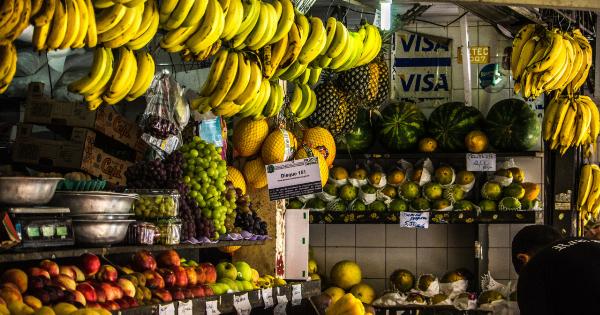Eating vegetables is essential for maintaining a healthy diet and getting the necessary nutrients our bodies need. However, the debate between frozen and fresh vegetables has been ongoing for quite some time.
Some argue that fresh vegetables are superior in terms of taste and nutritional value, while others swear by the convenience and availability of frozen options. In this article, we will explore the advantages and disadvantages of both frozen and fresh vegetables to help you make an informed decision about which is better for you.
Fresh vegetables: the pros and cons
When it comes to fresh vegetables, the appeal is undeniable. The vibrant colors, crisp textures, and delicious flavors make fresh produce a delightful addition to any meal. Here are some of the advantages and disadvantages of consuming fresh vegetables:.
Advantages of fresh vegetables
1. Higher Nutrient Content: Fresh vegetables are often lauded for their higher nutrient content compared to their frozen counterparts. The immediate consumption of fresh produce ensures that you get the maximum nutritional value from these vegetables.
2. Superior Taste and Texture: Fresh vegetables have a distinct advantage when it comes to taste and texture. The crispness and juiciness of fresh vegetables offer a sensory experience that frozen options cannot replicate.
3. Variety and Seasonality: Fresh vegetables offer a wider variety to choose from, especially when considering seasonal produce. They allow you to experiment with different flavors and incorporate the freshest ingredients into your meals.
4. Fewer Additives: Fresh vegetables do not require any additives or preservatives to increase their shelf life. They are as close to nature as you can get, ensuring a healthier option for your meals.
Disadvantages of fresh vegetables
1. Limited Availability: Fresh vegetables are subject to seasonality and geographic limitations. Depending on where you live, certain vegetables may not be available year-round, affecting your ability to include them in your diet consistently.
2. Shorter Shelf Life: Unlike their frozen counterparts, fresh vegetables have a shorter shelf life. They can spoil quickly if not properly stored, leading to food waste.
3. Higher Cost: Fresh vegetables are often more expensive than frozen ones, particularly when considering out-of-season or exotic produce.
This can make it challenging for individuals on a budget to incorporate a diverse range of fresh vegetables into their diet.
4. Time-Consuming: Preparing fresh vegetables requires washing, cutting, and cooking time. For individuals with busy schedules or limited culinary skills, this additional preparation can be a deterrent to consuming fresh produce regularly.
Frozen vegetables: the pros and cons
Frozen vegetables, on the other hand, offer convenience, availability, and longer shelf life. Here are some of the advantages and disadvantages of consuming frozen vegetables:.
Advantages of frozen vegetables
1. Longer Shelf Life: One of the primary advantages of frozen vegetables is their extended shelf life. Freezing vegetables dramatically slows down the spoilage process, allowing you to store them for longer periods without compromising their quality.
2. Convenience: Frozen vegetables are pre-washed, pre-cut, and pre-packaged, making them incredibly convenient for quick and easy meal preparation. They can be stored in the freezer, ready to be used whenever needed.
3. Year-Round Availability: Since frozen vegetables are not affected by seasonality, they are available year-round. This ensures that you can consistently incorporate a wide variety of vegetables into your diet regardless of the time of year.
4. Retention of Nutritional Value: Contrary to popular belief, frozen vegetables retain a significant amount of their nutritional value.
The freezing process helps preserve vitamins and minerals, making them a viable option for those looking to reap the benefits of vegetables without compromising nutrient intake.
Disadvantages of frozen vegetables
1. Texture and Taste: While frozen vegetables may be more convenient, they can sometimes suffer in terms of texture and taste. The freezing process can result in a slightly mushy texture and a loss of the vibrant flavors that fresh vegetables offer.
2. Potential Additives: Some frozen vegetables may contain added salt, seasonings, or sauces to enhance flavor. This can be a disadvantage for individuals with specific dietary restrictions or those looking to limit sodium intake.
3. Limited Variety: Although frozen vegetables come in a wide range of options, they may not offer the same variety as fresh vegetables. Exotic or less popular vegetables may be harder to find in the frozen section of your local grocery store.
Conclusion: Fresh or Frozen?
Ultimately, whether fresh or frozen vegetables are better for you depends on your personal preferences, lifestyle, and specific dietary needs.
Fresh vegetables are known for their superior taste and texture, while frozen vegetables offer convenience and availability throughout the year. If you have easy access to a variety of fresh vegetables, the increased nutrient content and sensory experience may make them the ideal choice for you.
However, if you struggle with limited availability, time constraints, or budgetary restraints, frozen vegetables can be a practical alternative. Additionally, frozen vegetables can be a great way to enjoy certain out-of-season produce when fresh options are limited.
It’s worth noting that a combination of both fresh and frozen vegetables can offer a diverse and nutritionally balanced diet.
Ultimately, the key is to prioritize including vegetables in your daily meals, regardless of whether they are fresh or frozen.
Vegetables are crucial for overall health and well-being, and incorporating them into your diet in any form is a step in the right direction.




























